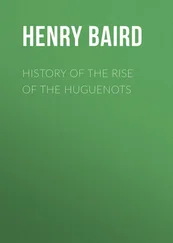John Abbott - Henry IV, Makers of History
Здесь есть возможность читать онлайн «John Abbott - Henry IV, Makers of History» — ознакомительный отрывок электронной книги совершенно бесплатно, а после прочтения отрывка купить полную версию. В некоторых случаях можно слушать аудио, скачать через торрент в формате fb2 и присутствует краткое содержание. Жанр: foreign_antique, foreign_prose, на английском языке. Описание произведения, (предисловие) а так же отзывы посетителей доступны на портале библиотеки ЛибКат.
- Название:Henry IV, Makers of History
- Автор:
- Жанр:
- Год:неизвестен
- ISBN:нет данных
- Рейтинг книги:5 / 5. Голосов: 1
-
Избранное:Добавить в избранное
- Отзывы:
-
Ваша оценка:
- 100
- 1
- 2
- 3
- 4
- 5
Henry IV, Makers of History: краткое содержание, описание и аннотация
Предлагаем к чтению аннотацию, описание, краткое содержание или предисловие (зависит от того, что написал сам автор книги «Henry IV, Makers of History»). Если вы не нашли необходимую информацию о книге — напишите в комментариях, мы постараемся отыскать её.
Henry IV, Makers of History — читать онлайн ознакомительный отрывок
Ниже представлен текст книги, разбитый по страницам. Система сохранения места последней прочитанной страницы, позволяет с удобством читать онлайн бесплатно книгу «Henry IV, Makers of History», без необходимости каждый раз заново искать на чём Вы остановились. Поставьте закладку, и сможете в любой момент перейти на страницу, на которой закончили чтение.
Интервал:
Закладка:
Calvin died in 1564, eleven years after the birth of Henry of Navarre, at the age of fifty-five. For several years he was so abstemious that he had eaten but one meal a day. 1 1 In reference to the execution of Servetus for heresy, an event which, in the estimation of many, has seriously tarnished the reputation of Calvin, the celebrated French historian M. Mignet, in a very able dissertation, establishes the following points: 1. Servetus was not an ordinary heretic; he was a bold pantheist, and outraged the dogma of all Christian communions by saying that God, in three persons, was a Cerberus, a monster with three heads. 2. He had already been condemned to death by the Catholic doctors at Vienne in Dauphiny. 3. The affair was judged, not by Calvin, but by the magistrates of Geneva; and if it is objected that his advice must have influenced their decision, it is necessary to recollect that the councils of the other reformed cantons of Switzerland approved the sentence with a unanimous voice. 4. It was of the utmost importance for the Reformation to separate distinctly its cause from that of such an unbeliever as Servetus. The Catholic Church, which in our day accuses Calvin of having participated in his condemnation, much more would have accused him, in the sixteenth century, with having solicited his acquittal.
Inhabitants of France.
At this time the overwhelming majority of the inhabitants of France were Catholics – it has generally been estimated a hundred to one; but the doctrines of the reformers gained ground until, toward the close of the century, about the time of the Massacre of St. Bartholomew, the Protestants composed about one sixth of the population.
The storm of persecution which fell upon them was so terrible that they were compelled to protect themselves by force of arms. Gradually they gained the ascendency in several cities, which they fortified, and where they protected refugees from the persecution which had driven them from the cities where the Catholics predominated. Such was the deplorable condition of France at the time of which we write.
Antony of Bourbon.
In the little kingdom of Navarre, which was but about one third as large as the State of Massachusetts, and which, since its dismemberment, contained less than three hundred thousand inhabitants, nearly every individual was a Protestant. Antony of Bourbon, who had married the queen, was a Frenchman. With him, as with many others in that day, religion was merely a badge of party politics. Antony spent much of his time in the voluptuous court of France, and as he was, of course, solicitous for popularity there, he espoused the Catholic side of the controversy.
Jeanne d'Albret.
Jeanne d'Albret was energetically a Protestant. Apparently, her faith was founded in deep religious conviction. When Catharine of Medici advised her to follow her husband into the Catholic Church, she replied with firmness,
"Madam, sooner than ever go to mass, if I had my kingdom and my son both in my hands, I would hurl them to the bottom of the sea before they should change my purpose."
The separation.
Jeanne had been married to Antony merely as a matter of state policy. There was nothing in his character to win a noble woman's love. With no social or religious sympathies, they lived together for a time in a state of respectful indifference; but the court of Navarre was too quiet and religious to satisfy the taste of the voluptuous Parisian. He consequently spent most of his time enjoying the gayeties of the metropolis of France. A separation, mutually and amicably agreed upon, was the result.
Different life.
Antony conveyed with him to Paris his son Henry, and there took up his residence. Amidst the changes and the fluctuations of the ever-agitated metropolis, he eagerly watched for opportunities to advance his own fame and fortune. As Jeanne took leave of her beloved child, she embraced him tenderly, and with tears entreated him never to abandon the faith in which he had been educated.
Jeanne d'Albret, with her little daughter, remained in the less splendid but more moral and refined metropolis of her paternal domain. A mother's solicitude and prayers, however, followed her son. Antony consented to retain as a tutor for Henry the wise and learned La Gaucherie, who was himself strongly attached to the reformed religion.
Rage of the Pope.
The inflexibility of Jeanne d'Albret, and the refuge she ever cheerfully afforded to the persecuted Protestants, quite enraged the Pope. As a measure of intimidation, he at one time summoned her as a heretic to appear before the Inquisition within six months, under penalty of losing her crown and her possessions. Jeanne, unawed by the threat, appealed to the monarchs of Europe for protection. None were disposed in that age to encourage such arrogant claims, and Pope Pius VI. was compelled to moderate his haughty tone. A plot, however, was then formed to seize her and her children, and hand them over to the "tender mercies" of the Spanish Inquisition. But this plot also failed.
Growth of Protestantism.
In Paris itself there were many bold Protestant nobles who, with arms at their side, and stout retainers around them, kept personal persecution at bay. They were generally men of commanding character, of intelligence and integrity. The new religion, throughout the country, was manifestly growing fast in strength, and at times, even in the saloons of the palace, the rival parties were pretty nearly balanced. Although, throughout the kingdom of France, the Catholics were vastly more numerous than the Protestants, yet as England and much of Germany had warmly espoused the cause of the reformers, it was perhaps difficult to decide which party, on the whole, in Europe, was the strongest. Nobles and princes of the highest rank were, in all parts of Europe, ranged under either banner. In the two factions thus contending for dominion, there were, of course, some who were not much influenced by conscientious considerations, but who were merely struggling for political power.
Catharine's blandishments.
When Henry first arrived in Paris, Catharine kept a constant watch over his words and his actions. She spared no possible efforts to bring him under her entire control. Efforts were made to lead his teacher to check his enthusiasm for lofty exploits, and to surrender him to the claims of frivolous amusement. This detestable queen presented before the impassioned young man all the blandishments of female beauty, that she might betray him to licentious indulgence. In some of these infamous arts she was but too successful.
Undecided action.
Seizure of the queen.
Catharine, in her ambitious projects, was often undecided as to which cause she should espouse and which party she should call to her aid. At one time she would favor the Protestants, and again the Catholics. At about this time she suddenly turned to the Protestants, and courted them so decidedly as greatly to alarm and exasperate the Catholics. Some of the Catholic nobles formed a conspiracy, and seized Catharine and her son at the palace of Fontainebleau, and held them both as captives. The proud queen was almost frantic with indignation at the insult.
Civil war.
The Protestants, conscious that the conspiracy was aimed against them, rallied for the defense of the queen. The Catholics all over the kingdom sprang to arms. A bloody civil war ensued. Nearly all Europe was drawn into the conflict. Germany and England came with eager armies to the aid of the Protestants. Catharine hated the proud and haughty Elizabeth, England's domineering queen, and was very jealous of her fame and power. She resolved that she would not be indebted to her ambitious rival for aid. She therefore, most strangely, threw herself into the arms of the Catholics , and ardently espoused their cause. The Protestants soon found her, with all the energy of her powerful mind, heading their foes. France was deluged in blood.
Читать дальшеИнтервал:
Закладка:
Похожие книги на «Henry IV, Makers of History»
Представляем Вашему вниманию похожие книги на «Henry IV, Makers of History» списком для выбора. Мы отобрали схожую по названию и смыслу литературу в надежде предоставить читателям больше вариантов отыскать новые, интересные, ещё непрочитанные произведения.
Обсуждение, отзывы о книге «Henry IV, Makers of History» и просто собственные мнения читателей. Оставьте ваши комментарии, напишите, что Вы думаете о произведении, его смысле или главных героях. Укажите что конкретно понравилось, а что нет, и почему Вы так считаете.












